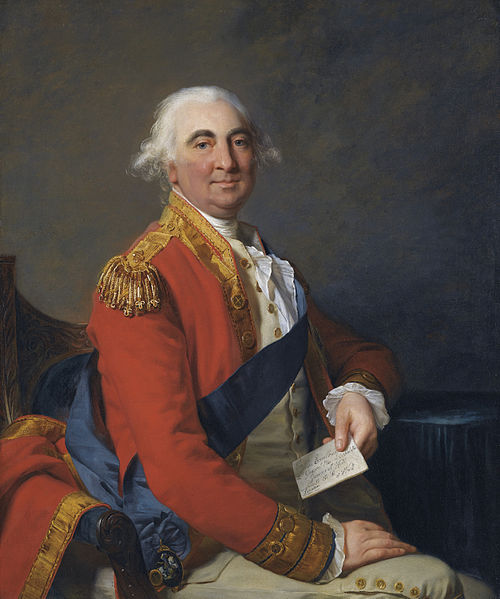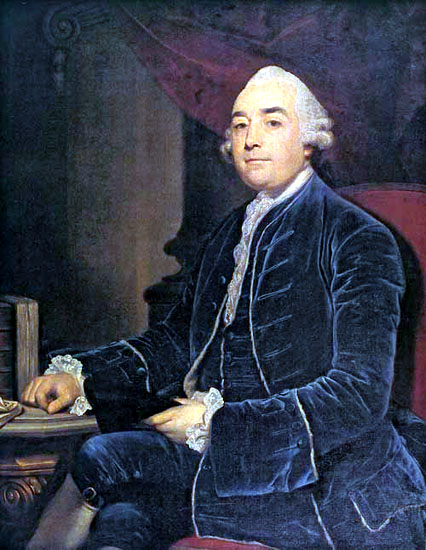<Back to Index>
- Philosopher Henrik Steffens, 1773
- Writer Novalis (Georg Philipp Friedrich Freiherr von Hardenberg), 1772
- Prime Minister of Great Britain William Petty - FitzMaurice, 2nd Earl of Shelburne, 1737
PAGE SPONSOR


William Petty - FitzMaurice, 1st Marquess of Lansdowne, KG, PC (2 May 1737 – 7 May 1805), known as The Earl of Shelburne between 1761 and 1784, by which title he is generally known to history, was an Irish born British Whig statesman who was the first Home Secretary in 1782 and then Prime Minister 1782 – 1783 during the final months of the American War of Independence.
Shelburne was born in Dublin in 1737 and spent his formative years in Ireland. He served in the British army during the Seven Years War taking part in the Raid on Rochefort and the Battle of Minden. As a reward for his conduct at the Battle of Kloster Kampen Shelburne was appointed an aide - de - camp to George III. He became involved in politics, becoming a Member of Parliament in 1760. After his father's death in 1761 he inherited his title and was elevated to the House of Lords and took an active role in politics. He served as President of the Board of Trade in the Grenville Ministry but resigned this position after only a few months and began to associate with William Pitt.
When Pitt was made Prime Minister in 1766 Shelburne was appointed as Southern Secretary a position which he held for two years. He departed office during the Corsican Crisis and joined the Opposition. Along with Pitt he was an advocate of a conciliatory policy towards Britain's American Colonies and a long term critic of the North Government's measures in America.
Following the fall of the North government Shelburne joined its replacement led by Lord Rockingham. Shelburne was made Prime Minister in 1782 following Rockingham's death with the American War still being fought. Shelburne's government was brought down largely due to the terms of the Peace of Paris which brought the conflict to an end.
He was an early advocate of free trade. He was born William FitzMaurice in Dublin in Ireland, the first son of John FitzMaurice, who was the second surviving son of the 1st Earl of Kerry. Lord Kerry had married Anne Petty, the daughter of Sir William Petty, Surveyor General of Ireland,
whose elder son had been created Baron Shelburne in 1688 and (on the
elder son's death) whose younger son had been created Baron Shelburne
in 1699 and Earl of Shelburne in 1719. On the younger son's death the
Petty estates passed to the aforementioned John FitzMaurice, who
changed his branch of the family's surname to "Petty" in place of
"FitzMaurice", and was created Viscount FitzMaurice later in 1751 and
Earl of Shelburne in 1753 (after which his elder son was styled Viscount FitzMaurice). FitzMaurice spent his childhood "in the remotest parts of the south of Ireland," and, according to his own account, when he entered Christ Church, Oxford, in 1755, he had "both everything to learn and everything to unlearn". From a tutor whom
he describes as "narrow - minded" he received advantageous guidance in
his studies, but he attributes his improvement in manners and in
knowledge of the world chiefly to the fact that, as was his "fate
through life", he fell in "with clever but unpopular connexions". Shelburne was one of the first British statesmen to advocate free trade, his conversion to which he attributed to a journey he made to London in 1761, when he accompanied Adam Smith. In 1795 he described this to Dugald Stewart: I
owe to a journey I made with Mr Smith from Edinburgh to London, the
difference between light and darkness through the best part of my life.
The novelty of his principles, added to my youth and prejudices, made
me unable to comprehend them at the time, but he urged them with so
much benevolence, as well as eloquence, that they took a certain hold,
which, though it did not develope itself so as to arrive at full
conviction for some few years after, I can fairly say, has constituted,
ever since, the happiness of my life, as well as any little
consideration I may have enjoyed in it.
Shortly after leaving the university he served in
20th Foot regiment commanded by James Wolfe during the Seven Years' War. He became friends with one of his fellow officers Charles Grey whose career he later assisted. In 1757 he took part in the amphibious Raid on Rochefort which
withdrew without making any serious attempt on the town. The following
year he was sent to serve in Germany and so distinguished himself at Minden and Kloster - Kampen that he was raised to the rank of Colonel. Following the death of George II and the accession of his grandson George III in 1760 Shelburne was appointed Aide - de - Camp to
the new King. This brought protests from several members of the cabinet
as it meant he was promoted ahead of much more senior officers. In response to the appointment Duke of Richmond resigned a post in the royal household. In 1760, he was returned to the British House of Commons as member for Wycombe while from 1761 simultaneously represented Kerry in the Irish House of Commons which was then a separate body. However, following the death of his father in 1761 he succeeded him as 2nd Earl of Shelburne in the Peerage of Ireland and 2nd Baron Wycombe in the Peerage of Great Britain he
ceased to sit in either House of Commons and moved up to the House of
Lords. He was succeeded in Wycombe by one of his supporters Colonel Isaac Barré who had a distinguished war record after serving with James Wolfe in Canada. Shelburne's new military role close to the King brought him into communication with Lord Bute,
who was the King's closest advisor and a senior minister in the
government. In 1761 Shelburne was employed by Bute to negotiate for the
support of Henry Fox. Fox held the lucrative but unimportant post of Paymaster of the Forces,
but commanded large support in the House of Commons and could boost
Bute's powerbase. Shelburne was opposed to Pitt, who had resigned from
the government in 1761. Under instructions from Shelburne, Barré
made a violent attack on Pitt in the House of Commons. During
1762 negotiations for a peace agreement went on in London and Paris.
Eventually a deal was agreed but it was heavily criticised for the
perceived leniency of its terms as it handed back a number of captured
territories to France and Spain. Defending it in the House of Lords,
Shelburne observed "the security of the British colonies in North
America was the first cause of the war" asserting that security "has
been wisely attended to in the negotiations for peace". Led
by Fox, the government was able to push the peace treaty through
parliament despite opposition led by Pitt. Shortly afterwards, Bute
chose to resign as Prime Minister and retire from politics and was
replaced by George Grenville. Shelburne joined the Grenville ministry in 1763 as First Lord of Trade.
By this stage Shelburne had changed his opinion of Pitt and become an
admirer of him. After failing to secure Pitt's inclusion in the Cabinet
he resigned office after only a few months. Having moreover on account
of his support of Pitt on the question of Wilkes's expulsion from the House of Commons incurred the displeasure of the King, he retired for a time to his estate. After Pitt's return to power in 1766 he became Southern Secretary,
but during Pitt's illness his conciliatory policy towards America was
completely thwarted by his colleagues and the King, and in 1768 he was
dismissed from office. During the Corsican Crisis, sparked by the French invasion of Corsica, Shelburne was the major voice in the cabinet who favoured assisting the Corsican Republic.
Although secret aid was given to the Corsicans it was decided not to
intervene military and provoke a war with France, a decision made
easier by the departure of the hard line Shelburne from the cabinet. In June 1768 the General Court incorporated the district of Shelburne, Massachusetts, from
the area formerly known as "Deerfield Northeast" and in 1786 the
district became a town. The town was named in honour of Lord Shelburne,
who, in return sent a church bell, which never reached the town.
Shelburne went into Opposition where he continued to associate with William Pitt, 1st Earl of Chatham. They were both critical of the policies of the North government in the years leading up to the outbreak of the American War of Independence in 1775. As the war progressed Shelburne co-operated with the Rockingham Whigs to attack the government of Lord North. After a British army was compelled to surrender at the Battle of Saratoga in 1777, Shelburne joined other leaders of the Opposition to call for a total withdrawal of British troops. In March 1782 following the down fall of the North Government Shelburne agreed to take office under Lord Rockingham on condition that the King would recognise the United States.
Following the sudden and unexpected death of Lord Rockingham on 1 July
1782 Shelburne succeeded him as Prime Minister. Shelburne's appointment
by the King provoked Charles James Fox and his supporters, including Edmund Burke, to resign their posts on 4 July 1782. Burke
scathingly compared Shelburne to his predecessor Rockingham. One of the
figures brought in as a replacement was the 23 year old William Pitt, son of Shelburne's former political ally, who became Chancellor of the Exchequer. Shelburne's government continued to negotiate for peace in Paris. Fox's departure led to the unexpected creation of a coalition involving Fox and Lord North which
dominated the Opposition. In April 1783 the Oppposition forced
Shelburne's resignation. The major achievement of Shelburne's time in
office was the agreement of peace terms which formed the basis of the Peace of Paris bringing the American War of Independence to an end. His fall being perhaps hastened by his plans for the reform of the public service. He had also in contemplation a Bill to promote free trade between Britain and the United States.
When Pitt became Prime Minister in 1784, Shelburne, instead of receiving a place in the Cabinet, was created Marquess of Lansdowne. Though giving a general support to the policy of Pitt, he from this time ceased to take an active part in public affairs. Lord Lansdowne was twice married: First to Lady Sophia Carteret (26 August 1745 – 5 January 1771), daughter of the 1st Earl Granville, through whom he obtained the Lansdowne estates near Bath. They had at least one child. Secondly to Lady Louisa FitzPatrick (1755 – 7 August 1789), daughter of the 1st Earl of Upper Ossory. They had at least two children.